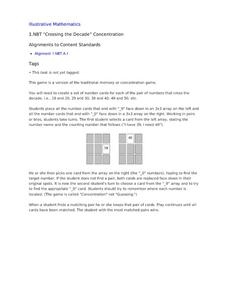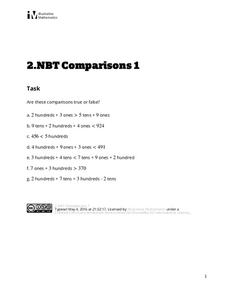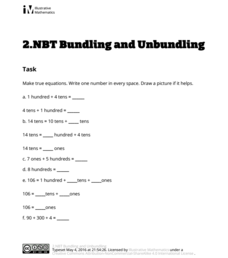Illustrative Mathematics
Roll & Build
Develop young mathematicians' understanding of place value with this hands-on math activity. Working in pairs, learners take turns building two-digit numbers by rolling two ten-sided dice. Base ten blocks are then used to model the...
Illustrative Mathematics
Ordering 4-digit Numbers
Place value is a concept that sets a foundation for mathematical understanding. Ordering these sets of three- and four-digit numbers will help to strengthen that foundation. A great independent practice worksheet or short assessment to...
Illustrative Mathematics
Comparing Numbers
Young mathematicians spin their way to a deeper number sense with this fun, collaborative activity. Using two spinners, one with the numbers 0-9 and the other with the decades 00-90, pairs of students take turns building and comparing...
Illustrative Mathematics
Making 124
How many ways can you make the number 124 using only tens and ones? Use a task that prompts young mathematicians to make 124 in as many ways as possible.
Illustrative Mathematics
Hundred Chart Digit Game
Math games, especially in the primary grades, provide great opportunities for developing the number sense of young mathematicians. Working in pairs with a deck of single-digit cards, students take turns drawing two cards and reading the...
Illustrative Mathematics
“Crossing the Decade” Concentration
Young mathematicians concentrate on learning to fluently count. Following the rules of the classic game Memory, children take turns flipping over cards in order to find pairs of numbers that cross a decade (e.g. 29 and 30). For younger...
Illustrative Mathematics
Comparisons 1
A seven question learning exercise asks learners to use place value strategies to decide if each number comparison is true or false.
Illustrative Mathematics
Bundling and Unbundling
Seven tens, plus five ones, equals 75. Five ones, plus seven tens, also equals 75. These are the types of equations learners are asked to make true in a worksheet with 11 unfinished equations.
Illustrative Mathematics
Regrouping
What number does 6 tens and 16 ones represent? How is it different from or similar to the number that 7 tens and 6 ones represent? This is the type of questions learners are asked to solve as a way to understand the concept of regrouping.
EngageNY
Estimating Digits in a Quotient
Boiling down any division problem to a one-digit divisor problem sure makes estimation easy. The lesson shows how to estimate division problems by using place value understanding and basic arithmetic facts to simplify the division. Some...
Los Angeles County Office of Education
Assessment for the California Mathematics Standards Grade 1
Here is an assessment designed to test mathematicians' knowledge of writing numbers, comparing numbers, skip counting, solving addition and subtraction problems; along with measuring objects, telling time, identifying shapes, reading...
Khan Academy
Khan Academy: 2 Digit Place Value Challenge
Practice breaking numbers apart into tens and ones.
Khan Academy
Khan Academy: 3 Digit Place Value Challenge
Practice breaking numbers into hundreds, tens, and ones.












